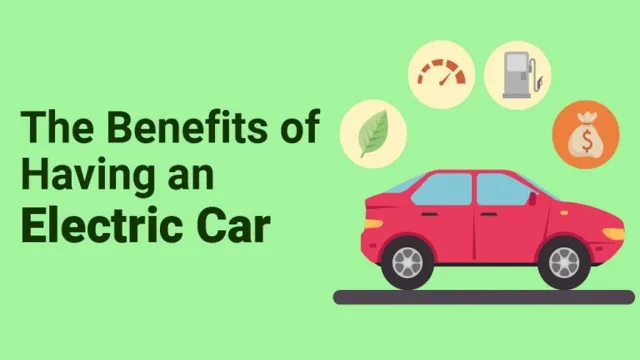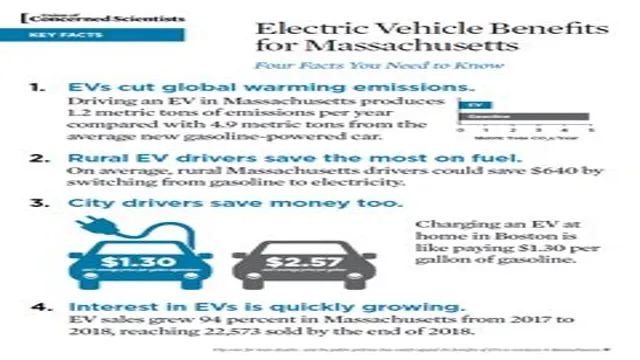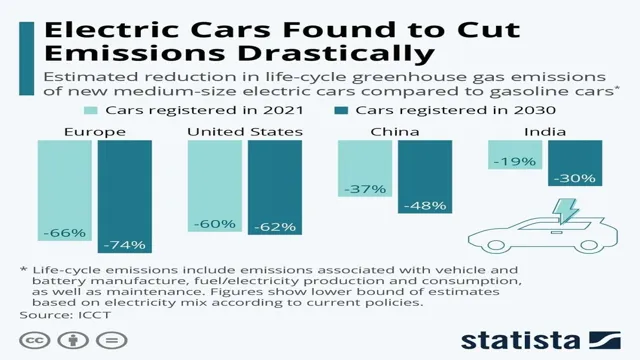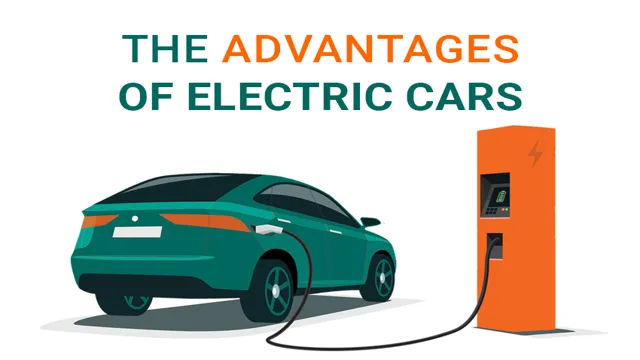Rev Up Your Life: The Incredible Benefits of Owning an Electric Car
Electric cars are making waves in the automotive industry, and for good reason. With their increasing availability, affordable prices, and numerous benefits, it’s no wonder that more and more people are considering making the switch from traditional gasoline-powered vehicles. From saving money on gas to reducing carbon emissions, electric cars offer a host of advantages that not only benefit the wallets of drivers but also the environment as a whole.
In this blog post, we’ll delve into the many benefits of electric cars and why they’re worth considering for your next vehicle purchase. So, buckle up, put on your seatbelts, and let’s explore the world of electric cars.
Economic Benefits
If you’re considering purchasing an electric car, it’s good to know that there are many economic benefits to making the switch. The most obvious benefit is savings on fuel costs. Electric cars can be charged at home for a fraction of the cost of gas, and many public charging stations offer free or low-cost charging.
Additionally, electric cars require less maintenance than traditional gas-powered cars, which can save you money on things like oil changes and engine repairs. Another economic benefit of electric cars is that they often have lower insurance rates due to their safety features and lower risk of theft. Finally, some states offer tax incentives or rebates for purchasing an electric car, which can significantly offset the initial cost of the vehicle.
All of these factors make electric cars not only environmentally friendly alternatives but also cost-effective options over the long run.
Lower Fuel Costs
Lower fuel costs offer a host of economic benefits to individuals and businesses alike. As fuel prices continue to rise globally, cutting fuel costs can significantly affect the bottom line. People can save money by driving more fuel-efficient cars or choosing public transportation options.
Similarly, businesses can save money by employing fuel-saving strategies, such as maintaining vehicles appropriately, improving driving habits, and utilizing fuel management software. Lower fuel costs can improve profitability, increase competitiveness, and help businesses reduce their carbon footprints. It can also benefit individuals by putting money back into their pockets, allowing them to spend or save as they see fit.
Furthermore, lower fuel costs can reduce the economic burden on lower-income individuals who are disproportionately affected by rising fuel prices. Overall, lowering fuel costs can significantly benefit individuals and businesses and contribute to a more sustainable future.
Tax Credits and Rebates
When considering the benefits of tax credits and rebates, it’s important to focus on the economic impact. Tax credits are a form of economic incentive that provide financial relief to individuals and businesses. The government offers tax credits to encourage certain behaviors, such as investing in renewable energy sources or purchasing electric vehicles.
By offering these credits, the government helps to promote a healthier environment and create jobs in the renewable energy industry. Rebates, on the other hand, provide immediate financial relief by reducing the cost of a purchase. For example, a homeowner who installs an energy-efficient HVAC system may be eligible for a rebate from their utility company.
This helps to offset the initial cost of the investment and promotes energy conservation. Ultimately, tax credits and rebates are tools that help to boost the economy in multiple ways, creating jobs and promoting sustainable practices.
Long-Term Savings
When it comes to long-term savings, there are plenty of economic benefits to consider. Putting money away for a rainy day or for your future retirement is not only a sound financial strategy, but it can also provide a sense of security and peace of mind. One of the biggest benefits of saving over the long term is the power of compounding interest.
This means that your money earns interest not only on the amount you initially invested, but also on the interest that your money earns over time. This can result in significant growth over time, and ultimately lead to greater wealth. Additionally, saving for the long term can also help you manage the unexpected.
Whether it’s a medical emergency, car repair, or some other unplanned expense, having a financial cushion can help you weather the storm without having to rely on credit cards or loans. By consistently saving over time, you can build up a safety net of funds that give you the freedom and flexibility to navigate life’s ups and downs. So if you haven’t started saving for the long term yet, it’s never too late to begin.
Whether you’re saving for a down payment on a house, your children’s education, or your own retirement, the economic benefits of long-term savings are well worth the effort.
Environmental Benefits
If you’re looking for a way to help the environment while enjoying the convenience of a car, then electric vehicles might be just what you need. One of the benefits of having an electric car is that they produce far less pollution than traditional gas-powered vehicles. EVs produce zero emissions, which means they don’t contribute to poor air quality or climate change.
They also use significantly less energy than gas cars, which has a huge impact on reducing fossil fuel demand. This is a major environmental benefit because the reduction in carbon emissions helps to prevent climate change, reduces smog, and contributes to cleaner air and water. With an electric car, you can be confident that you’re doing your part to help preserve the planet for future generations.
Plus, with more and more charging stations popping up, the convenience of charging has improved considerably. Consider the benefits of having an electric car for your next vehicle purchase and contribute towards a brighter, cleaner future.
Reduced Emissions
Reduced emissions not only benefit the environment but also have a positive impact on human health. When we reduce emissions, we decrease the amount of harmful pollutants that are released into the air, which can contribute to respiratory problems such as asthma and lung cancer. Moreover, emissions reduction slows down climate change, which has been linked to extreme weather conditions such as hurricanes and droughts.
By emitting fewer greenhouse gases, we also help to conserve natural resources, which can reduce the costs of producing and consuming goods and services. For example, when factories use less energy to produce things like cars and appliances, they save money on their own operating costs, which can be passed on to consumers in the form of lower prices. Overall, reducing emissions is an important step in protecting the environment and promoting sustainable living.
Sustainable Energy Source
Renewable energy sources, such as solar, wind, hydro and geothermal power, have several environmental benefits compared to fossil fuels. One of the most significant environmental benefits of sustainable energy is that it produces far fewer greenhouse gases. When we burn fossil fuels, it releases carbon dioxide (CO2) and other greenhouse gases into the atmosphere, which trap heat and cause global warming.
Renewable energy sources, on the other hand, generate no emissions or only minimal amounts of carbon dioxide. This means that sustainable energy sources can help to reduce the amount of greenhouse gases in the atmosphere, which can help to mitigate the effects of climate change. Additionally, renewable energy sources don’t create harmful air pollutants, which can have adverse effects on respiratory health.
Moreover, renewable energy sources like wind and solar energy generate power without consuming water resources, which is particularly important in areas experiencing water shortages. By using sustainable energy sources, we can reduce our carbon footprint and protect the planet for future generations.
Improved Air Quality
Improved Air Quality is one of the biggest environmental benefits that can be achieved through human efforts. As we all know, poor air quality is one of the leading causes of various health problems, such as respiratory diseases and lung cancer. By reducing air pollution levels, we can help to improve the air we breathe and ultimately, safeguard the health of our community.
One of the best ways to achieve this is by reducing the amount of energy we use and maximizing energy efficiency. This can be achieved by using clean energy sources such as solar, wind or hydro power. By reducing our dependency on fossil fuels, we can cut down on dangerous emissions that can harm both the environment and our health.
It is evident that our actions affect the quality of air we breathe, and by making conscious choices, we can work towards improving the air quality and ultimately achieve a healthier living environment for all.
Convenience Benefits
One of the most significant benefits of having an electric car is convenience. Unlike gas-powered cars, which require frequent stops at the gas station, electric cars can be charged overnight in the comfort of your own home. This means you can wake up to a fully charged car, ready to go when you are.
Additionally, electric cars require less maintenance than gas-powered cars, as they have fewer moving parts and don’t require oil changes, exhaust systems, or spark plugs. This not only saves time but can also save you money in the long run. Imagine not having to deal with the inconvenience of scheduling regular maintenance or unexpected breakdowns.
With an electric car, you can focus on what really matters – getting where you need to go efficiently and with ease.
Less Maintenance
When it comes to convenience benefits, there’s no doubt that less maintenance is a significant advantage. Whether it’s our cars, homes, or personal belongings, we all want to spend less time and money on upkeep. And the same goes for our technology.
With the rise of smart devices in our homes, the last thing we want is to spend hours tinkering with settings or troubleshooting issues. That’s why one of the most appealing aspects of smart home technology is the low maintenance required. Smart devices are designed to be easy to use, with intuitive interfaces and minimal upkeep.
Whether it’s automated updates, self-diagnosing features, or built-in support, smart devices take the stress out of home technology and let us focus on the things that really matter. So, if you’re looking for a way to simplify your life and reduce your burden of maintenance, smart home technology is the way to go.
Home Charging Station
A home charging station is a great convenience for electric vehicle owners. Instead of having to go out of your way to locate a charging point, you can simply plug in your car at home and let it charge overnight while you sleep. This not only saves you time and effort but also provides a sense of security knowing that your car will always be charged and ready to go when you need it.
In addition, having a home charging station gives you more control over your car’s charging schedule, allowing you to maximize energy efficiency and save money on your electric bill. So whether you are commuting to work or embarking on a road trip, a home charging station offers unmatched convenience and peace of mind that will make your electric vehicle experience more enjoyable than ever before.
Quieter Ride
One of the conveniences of a quieter ride is the ability to enjoy a peaceful and calming atmosphere. Vehicles that emit loud engine sounds can be disruptive and lead to a stressful experience for drivers and passengers alike. A quieter ride, on the other hand, can make short or long trips a more comfortable and enjoyable experience.
Improved insulation, better soundproofing materials, and innovative technologies have contributed to a decrease in noise levels in modern vehicles, providing drivers with a more relaxing and pleasant experience. With a quieter ride, you can appreciate nature’s sounds or converse with passengers without having to shout. As a result, you can feel more at ease and alert while driving, which can enhance your overall safety.
Quieter rides enable you to hear other sounds more clearly, such as honks, sirens, or other warnings, which can help you avoid accidents and other potential dangers on the road. Overall, a quieter ride offers numerous benefits, making driving both a more peaceful and safer experience.
Conclusion
In conclusion, having an electric car is like having a personal genie that grants your wish for a cleaner environment, lower fuel costs, and a smoother ride. You can navigate the streets with ease, knowing that not only are you saving money on gas, but you’re also avoiding harmful emissions that contribute to climate change. Plus, with the continual advancement in technology, the benefits of electric cars only continue to grow.
So join the electric revolution and let your car do the heavy lifting, while you enjoy a guilt-free ride towards a brighter future.”
FAQs
What are the environmental benefits of having an electric car?
Electric cars produce zero emissions, which helps to reduce air pollution and reduce our carbon footprint.
Can owning an electric car save me money?
Yes, electric cars are generally cheaper to maintain and operate than traditional gas cars since they require fewer oil changes and have lower fuel costs.
How far can I drive on a single charge in an electric car?
The range of an electric car depends on the make and model, but most cars can travel between 100-300 miles on a single charge.
Are electric cars safe to drive?
Yes, electric cars are just as safe, if not safer, than gas cars. They undergo the same safety tests and have additional safety features due to their unique power source.



